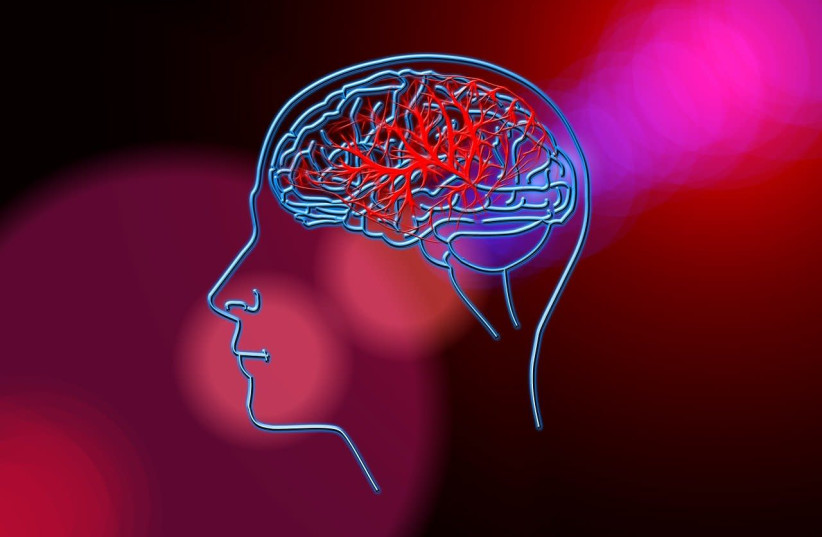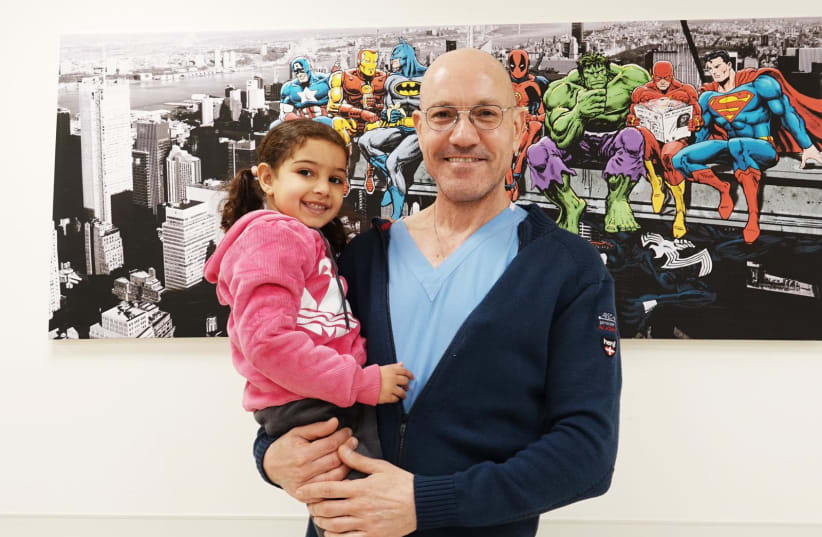A four-year-old girl named Ayla who lives in the West Bank town of Kalkilya suffered during the past year from repeated brain events that caused paralysis and life-threatening symptoms. No hospitals in the territories were able to diagnose her condition correctly.
Suddenly, her condition continued to deteriorate, and she suffered a stroke – a rare condition that occurs in only one in half-a-million children. But life-saving brain catheterization at Jerusalem’s Shaare Zedek Medical Center has put her back on her feet.
Dr. Yaakov Amsalem, head of the interventional neuroradiology unit, and colleagues at the brain catheterization department detected a life-threatening hemorrhage. After focused treatment and brain catheterization using an advanced method, the girl returned to full function.
It was another normal morning during which Ayla was getting ready for another day at the kindergarten near her house, when suddenly, without any prior warning, she fainted. Her worried parents rushed her to the local medical center in Kalkilya, which referred her to urgent care at the local hospital in Nablus where the doctors mistakenly diagnosed it as a problem in her legs.
She was sent home in good condition, but suddenly it began to deteriorate again. Her father, Muhammad, recalled the critical minutes: “We didn’t know what was causing the rapid decline in her condition. Suddenly, her entire right side became paralyzed. We returned to the doctor in Kalkilya who referred us to imaging tests at the government hospital in Ramallah. There the doctors said she had a malignant tumor in her brain. Her condition continued to deteriorate and she went into kidney failure.”


“We didn’t know what was causing the rapid decline in her condition. Suddenly, her entire right side became paralyzed. We returned to the doctor in Kalkilya who referred us to imaging tests at the government hospital in Ramallah. There the doctors said she had a malignant tumor in her brain. Her condition continued to deteriorate and she went into kidney failure.”
Muhammad
Treating a young child for a stroke
Amsalem is very experienced in treating the most complex cases in children and very small babies. He treated Ayla who, he said, suffered from severe cerebral hemorrhage in the left hemisphere and repeated episodes of stroke. He and his team diagnosed her as having a cerebral aneurysm – a ballooning in the wall of a blood vessel in the brain. A partial closure of the aneurysm was performed using coils and a very dense metallic stent that requires the infusion of a blood thinner so that blood clots don’t form. Because it is a very small artery with a thickness of one-and- a-half millimeters, despite the treatment, the cerebrovascular events continued. She became paralyzed on the right side of her body.
“After a comprehensive assessment, we discovered that the stent was almost completely blocked together with the aneurysm that did not close all the way. This means a stoppage of blood supply to the left hemisphere of the brain, which is responsible for the right side – for speech and understanding – a dangerous situation that could lead to a very severe disability and a real danger to her life. We had two options – performing a bypass, a treatment involving many risks, or a complex cerebral catheterization that requires a great deal of experience with tiny arteries that could have ruptured.”
After discussions with the hospital experts, it was decided to perform a complex cerebral catheterization in which a special balloon is used to close the aneurysm. It was carried out successfully and without side effects. To the team’s delight, the bleeding stopped. Within a few hours, her condition began to improve. In cooperation with the hematologists, they made an exact adjustment to the dosage of the medication suitable for the patient's weight and age.
“A stroke in children is a very rare phenomenon, and a recurrent stroke is an even rarer phenomenon. We are happy that we avoided irreversible damage. Treatment of children requires special attention and adaptation to the tiny arteries while taking into account the future growth of the various organs. We treat most of the pediatric cases with this problem in Israel,” Amsalem said.
A few days later, Ayla was discharged to her home in good condition and returned to full activity.
“We didn’t expect something like this to happen to Ayla. She is a generally healthy girl who likes to run and play. After almost a year during which we almost lost her, at Shaare Zedek they saved her and she returned to kindergarten and functioned normally like the other children. We want to thank the doctors and the nursing team and especially Dr. Amsalem,” Muhammed said.
